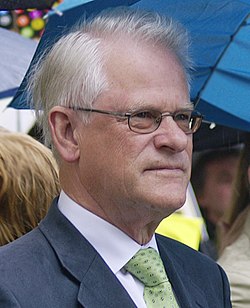| Gender | Male |
|---|---|
| Origin | |
| Word/name | Old Norse |
| Meaning | Protected by Yngvi |
| Region of origin | Scandinavia |
| Other names | |
| Related names | Inga, Igor |

The name Ingvar is an Old Norse first name for men common in Scandinavia meaning "protected by Yngvi". [1] The feminine version of the name is Inga .
Contents
The first element of the name is derived from Proto-Norse *Ing(w)ia (Ingi-), Norse Yngvi, who is better known by the title Freyr "Lord". The second element is probably either *harjaz (warrior) or *warjaz (defender). [2] The name consequently either meant Freyr's warrior or Freyr's defender.
Igor is a given name derived from the Scandinavian name Ingvar that was brought to Kievan Rus' by the Varangians.[ citation needed ]
Old English sources suggest that the birth-name of Ivar the Boneless might have been Ingvar; he is referred to as Hyngvar, Hingvar and Inguar in the English annals.[ citation needed ]